
The majority of HIV infections are sexually transmitted or are associated with pregnancy, childbirth and breastfeeding. Our work links prevention with treatment, care and support, reduces HIV-related stigma and discrimination, and responds to unique regional and national characteristics of the epidemic.
Articles by HIV and STIs
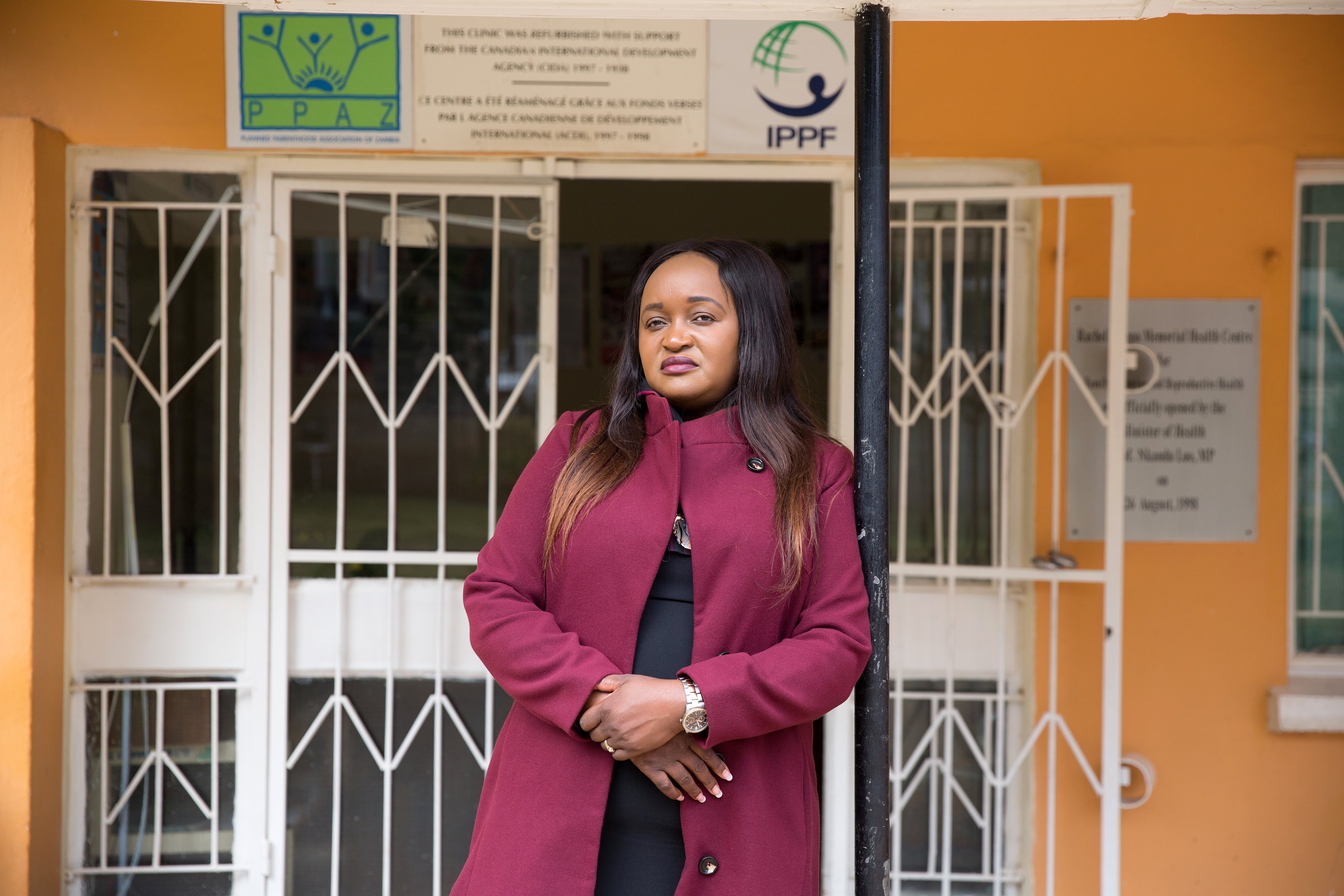
Decades of progress in sexual health care under threat in Zambia
For 50 years, the Planned Parenthood Association of Zambia (PPAZ) has provided sexual and reproductive health care, including contraception, safe abortion, HIV treatment. Through their Open Doors and Zambia Community HIV Prevention Project (Z-CHPP), PPAZ has become a safe-haven to access integrated health care; particularly to the many who would not normally be able to seek health care without fear of discrimination, like men who have sex with men and sex workers. These services are critical in a country like Zambia where being LGBTI and sex work is against the law. Yet, since the Global Gag Rule was reintroduced in January 2017, this vital care and support for local communities can no longer continue due to loss of funding. Since November many of PPAZ's services have already closed leaving communities with limited or no access to healthcare, and staff with no jobs. The Global Gag Rule impact Executive Director Joan N. Kamwale, based at the Lusaka clinic, was faced with breaking the news to her team that they would no longer have jobs, and to the many people they supported that they would no longer have access to PPAZ's safe space and quality of health care. “The 'stop order' came on the 17th of November 2017 and we closed on the 31st of December 2017. During the festive season, we were busy handing over everything. It was so depressing and very hectic not knowing where the next funds would come from and how to manage the situation with our clients. They already knew the clinic, so it was a very difficult time and moment for PPAZ to try and ensure our clients we would continue to provide the service”, explains Joan. “Now, in a week, we might see about maybe, 30 or less than 50 people, depending on those who come to the facility. Since now it is mandatory to test [for HIV], so we just rely on those who come to the facility. But before in a month we’d go to over 100, like 150 – 200 people, it was that high”, said Viness Kamulenge a physiotherapist and team leader at the Nyagwena clinic in Rufunsa. Young people in Rufunsa that were part of the sexual health and adolescence programmes fear that there will be a rise in teenage pregnancies as they have already seen a reduction in attendance and engagement. “Now there is a gap in the information flow and I am seeing a lot of my friends falling back into risky behaviour. The gap needs to be addressed. I have learned a lot about teenage pregnancy and but now that there is no information it will be a problem”, says 18-year-old student, Precious. Losing a safe place Many communities actively sought out PPAZ's clinics because of their reputation as a safe place but now those that visit can’t even take a seat in the waiting area. The social network that promotes PPAZ's health care relies on a trusted chain of communication that ensures those wanting to access information, will be protected and most importantly not judged, especially among the LGBTI and sex work communities. With a lack of available healthcare there is already evidence of people 'hiding away'; afraid to go to the government-run institutions where they feel discriminated against. “I am a former sex worker and this project helped me bring some of my friends who need the services. It was important for me to let them know how important it is to know their status and keep them healthy. This place was a key population friendly clinic. Now they will have to go to places where they might not get the right attention”, said Maczoline, a former peer promotor on the Open Doors project. Lovemore ‘Moses’ Lungu identifies as transgender, he joined the programme as a peer promoter after a friend told him about a place where he could get medical treatment without being judged. Inspired by his experience, he became a PPAZ peer promoter, encouraging other friends to seek health care. “At other places, we are unable to talk about the conditions that we find ourselves in. It is embarrassing, and people judge you. At PPAZ I could explain my condition without anyone judging me. They just helped me get the medication. A lot of my friends who need help now have nowhere to go and they are staying away”, said Lungu. Accessing treatment and care is vital for people living with HIV. Joyce has been living with HIV for two years and after initially struggling to accept her status received a treatment plan and support through PPAZ. “I felt very safe, I was happy that they protected me, if I hadn’t come at that time to get help I would have been seriously ill. From the time I commenced treatment till now, there’s a clear difference, my body is slowly coming back to normal. All I am asking is that they don’t stop giving us this treatment because a lot of people will suffer or even die without these medicines”, says Joyce. A threat to progress PPAZ is now operating at less than half capacity. Having lost 46% of its funding, PPAZ is looking to source funding from elsewhere. Partnering with the government has brought some relief with assistance being given for medical resources. The effects are evident and real and if not addressed immediately threaten to reverse decades of progress made in combating and mitigating some of the country’s vital sexual health care provision. “We were told of the Gag Rule but we didn’t expect for it to be done immediately. It came abruptly. There is usually a period for notice but there was no notice. We had 26 staff on site and at the head office, almost everyone was let go. The sad part is the increase in the disease burden. If they [key populations] are not accessing services that are stigma-free and discrimination-free, the disease burden, among the key population will increase", says former PPAZ Service Delivery Manager, Chipili Mulemfwe.
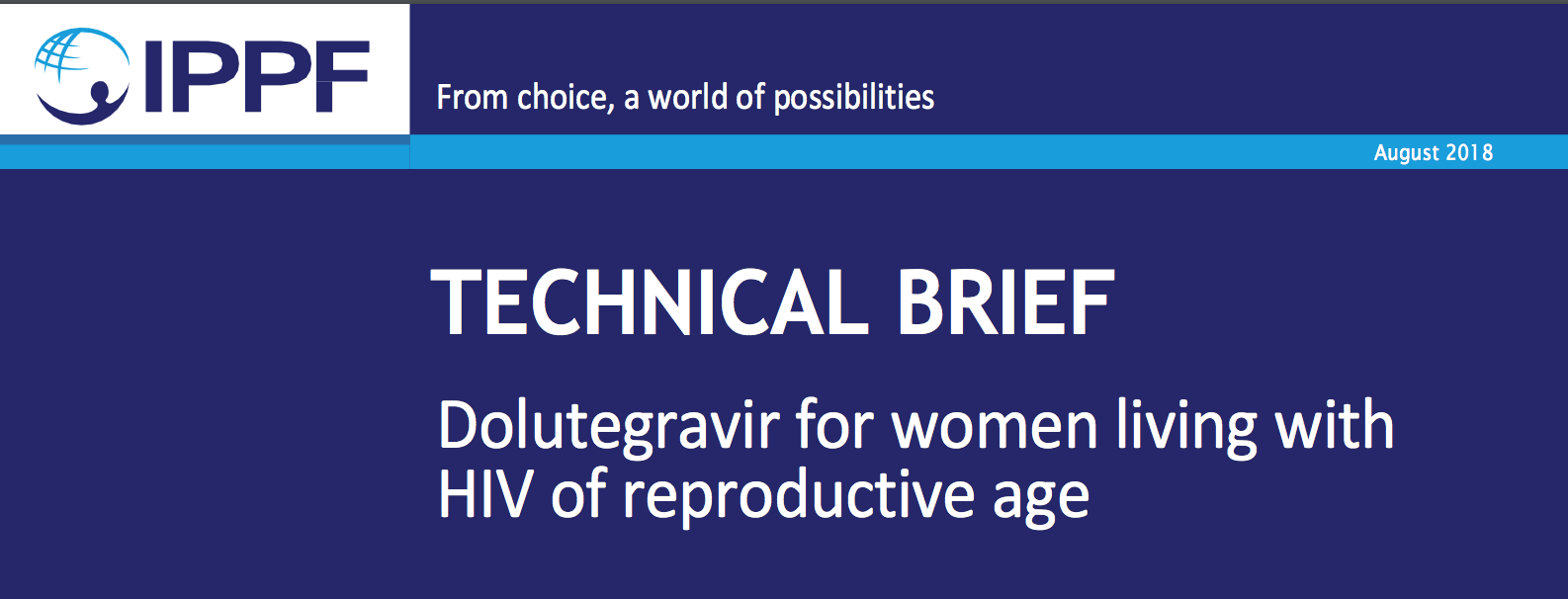
Technical brief: Dolutegravir for women living with HIV of reproductive age
In May 2018, the World Health Organization (WHO) reported a potential safety issue concerning dolutegravir (DTG), a common first-line antiretroviral treatment drug that is used to prevent and treat HIV infections. Preliminary findings from a study in Botswana found an increased risk of neural tube defects in infants born to women taking DTG at the time of conception. As a result of this study, WHO’s revised guidance on antiretroviral regimens for treating and preventing HIV infections, released in July 2018, include a caution on use of DTG by women and adolescent girls of childbearing potential. This brief aims to provide an overview of the research to date, current WHO guidance, and recommendations for IPPF.
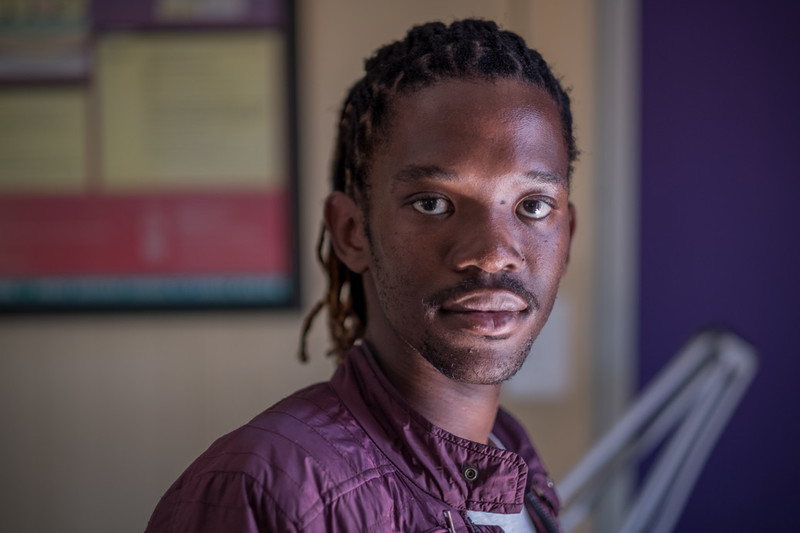
“I feel comfortable here”
19-year-old Joseph Ikatlholeng attends the Botswana Family Welfare Association (BOFWA) clinic in Gaborone every three months to receive antiretroviral treatment for HIV. He’s currently at university, studying for a degree in transport and logistics. “I hope to start my own transport business, maybe in the future an airline,” he says, laughing at the grandeur of his dreams. Joseph first came to BOFWA when he and his boyfriend decided to start practicing safe sex in March 2017. “I had put myself in risky situations so thought I should get tested for HIV,” he says. After learning he was HIV positive, Joseph tried out a few clinics to receive his treatment, but found BOFWA to be the most confidential and friendly. Sitting in the clinic behind the doctor’s desk, he says, “I never have any problems coming here. I feel comfortable here. At [the government clinic] there is no privacy; most of my friends are there. Sometimes if you go there you find them suspecting something, and everyone will be knowing your status. That’s why I prefer BOFWA.” Feeling safe is important to Joseph, who regularly faces discrimination as a man who has sex with other men. “Last week I was walking along, and these guys came past in the car shouting “gay, gay, gay.” I experience that treatment a lot.” Now, he and some LGBTI friends in Botswana are trying to work with their community to change the status quo about LGBTI people in the country. “We’re trying to tell the elders that we are here, we’re trying to change perceptions that LGBTI people are not just on drugs and having sex,” he says.
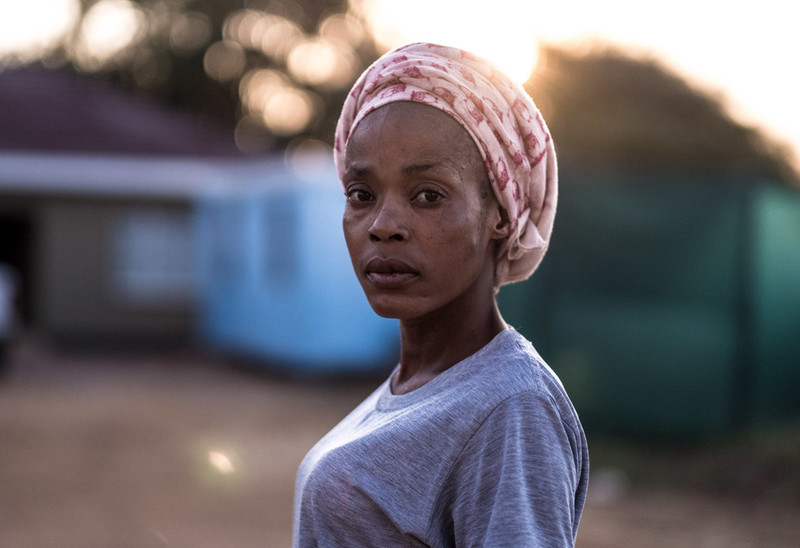
“We were dying in large numbers because we were afraid of those clinics”
“I’m a sex worker and peer outreach worker for the Nkaikela Youth Group. We reach the other sex workers because we are the ones that know them. We go to their houses, we go to the hotspots like clubs and the street; we reach them and encourage them to come here [to the Youth Group],” says Jackie Selelo, 34, sitting in one of the temporary office buildings at the Nkaikela Youth Group in Gaborone. With the support of BOFWA nurses, the Nkaikela Youth Group provides a range of sexual health care to sex workers: “They need health services for STIs, smear tests, HIV tests, and to be enrolling onto antiretroviral treatment for HIV,” Jackie explains. Female sex workers are in a particularly high-risk group for contracting HIV – the prevalence rate is 61.9% among the community – so having access to testing and treatment is vital. However, Jackie says many women don’t feel safe going to the government clinic. “They don’t accept us. It’s like we’re doing this because we want to, and just bringing disease. We’re not comfortable there and so sex workers are not [being tested and treated] in large numbers. Before BOFWA we were dying in large numbers because we were afraid of those clinics.” The difference between being treated by the staff at BOFWA is huge, according to Jackie. “We get a good service with BOFWA, they’re helping us to come for tests and they’re treating us good. With BOFWA if you come for HIV testing and were positive they would initiate you on to treatment the same day. Any problem you could discuss with them without fear, like they are your brothers and sisters.” She’s concerned that if funding continues to be cut, BOFWA nurses will stop coming to the Youth Group completely. “If they stop it will be difficult for us. We will die, we will be infected,” she says.
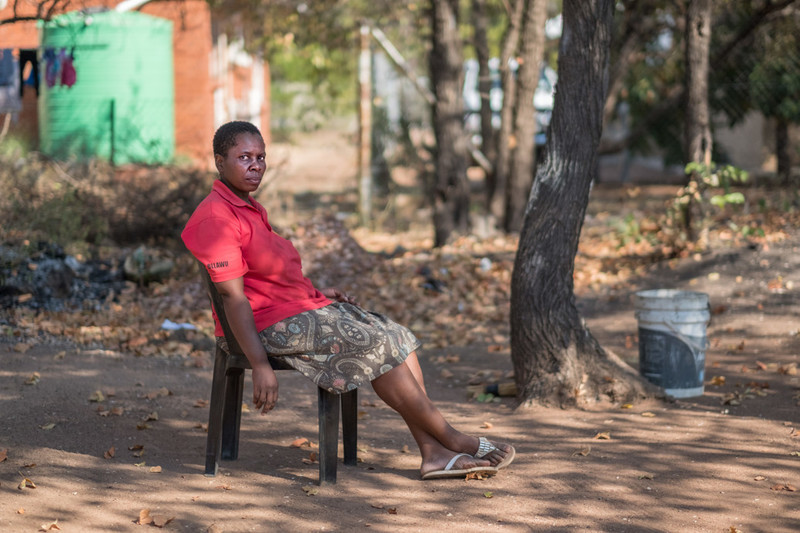
Vital HIV care for local communities forced to stop
The Botswana Family Welfare Association (BOFWA) has been providing sexual and reproductive health care through its eight clinics across Botswana since 1988. Health care includes HIV and STI tests and treatment, cervical screening, contraception, family planning advice and counselling. BOFAW is one of the few organizations to offer youth-friendly services and safe, accessible tailored care to vulnerable populations. With a population of approximately 2.3 million, the prevalence rate of HIV amongst Botswana’s population is 18.5%. Access & stigma Although HIV treatment is freely available at government clinics across Botswana, individuals from vulnerable communities need tailored healthcare according to Una Ngwenya, head of the BOFWA. “While the government provides health services to all its citizens… good quality services does not necessarily translate into reaching everyone equitably. We have many sub-communities like female sex workers, men who have sex with men, and the LGBTI population more generally who often do not access health services due to stigma and discrimination. At BOFWA we are conscious, mindful, and sensitive to their specific needs,” she says. Funded by USAID, the Linkages programme launched in 2016 enabling BOFWA to partner with organizations that support vulnerable and marginalized communities, like men who have sex with men and female sex workers. Individuals were linked to BOFWA clinics for HIV testing and treatment. HIV prevalence among these communities is particularly high (among female sex workers the prevalence rate is 61.9%, for example), yet treatment rates are low. Through Linkages, hundreds of HIV positive individuals were able to access treatment. “Since working with BOFWA… people who tested positive got linked into care and we were able to retain them. From the 90 clients we targeted in September 2017, we managed to get 93% of them on treatment and virally suppressed. That’s how much BOFWA helped us,” says Kamogelo Maribe, 26, who works at the Nkaikela Youth Group in Gaborone, which supports female sex workers. The Global Gag Rule Since the Global Gag Rule was reintroduced in January 2017, the Linkages programme has been forced to end. This vital care and support for local communities can no longer continue. The loss of USAID funding has forced the BOFWA clinic in Selebi Phikwe, a small mining town, to close. One of the many women affected is 44-year-old Gabatswane. When she lost her husband, and with few employment opportunities, Gabatswane was forced to turn to sex work to provide for her three children. When she contracted HIV she used to go to the BOFWA clinic for treatment. “I enjoyed the confidentiality that they had there, compared to the government [clinic] where everyone knows everything. It was comfortable talking to the BOFWA providers,” she says. Gabatswane is concerned about visiting the government clinic for treatment where she fears she will face stigma and discrimination for being HIV positive. “I’m scared [to go there] because now the community might know my status. At the government clinic you get ARVs in a separate space from everything else, but at BOFWA I used to go, and no one could identify me,” she says. Gabatswane now works at the local council. However, she worries about having to take hours or days out of work each month for treatment might mean she loses her job. “It’s a situation of hopelessness,” she says. The government clinic is also very busy, as after the mine closed HIV positive workers were transferred from the mine clinic to the government clinic, putting a strain on staff there. Gabatswane says it can take a long time to get treatment now: “Sometimes you get [to the government clinic] around 8am and you don’t leave until 2 in the afternoon. It means you have to wake up very early to access that service.” Supporting sex workers 400 kilometres north, in the city of Francistown, BOFWA is the only NGO providing youth and marginalised-community-friendly health care. Here, BOFWA had been partnering with Legabibo, an LGBTI organization, and Matshelo Community Development Association (MCDA), which supports sex workers, to provide HIV testing and treatment. The HIV prevalence in this region is above the national average at 23.3%. BOFWA has been an important place for local sex workers to seek healthcare, many say they can’t get the same type of treatment and care at other clinics. Fear of treatment not being confidential at government clinics is a major barrier to receiving healthcare for many sex workers. They wish that more services were available to them, including Pre Exposure Prophylaxis – a HIV treatment for those that are HIV negative but at risk of contracting the disease. Naima Mutukwa, 31, is a peer outreach worker for Legabibo. Since the Linkages programme ended he has had to transfer his HIV positive peers from BOFWA to a new clinic and worries some of them will not continue treatment. “I told them in 3 months you must be treated again but that we can’t go to BOFWA, and they said they don’t like the new place. So now they’re just not getting treatment, they refuse to get tested or treated with the government,” he says.
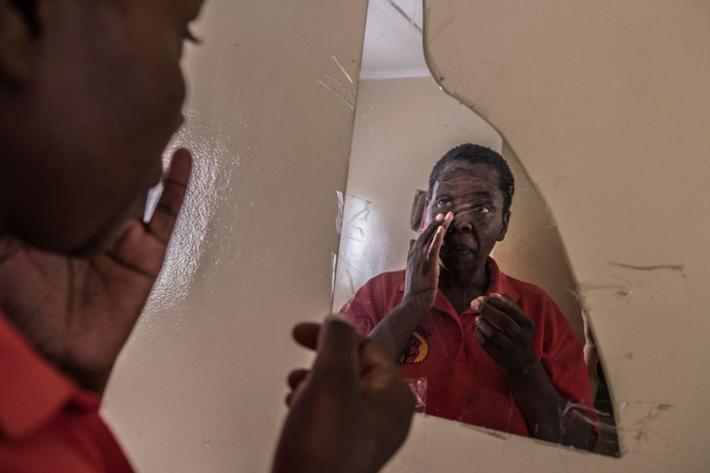
In pictures: Vital HIV care for local communities in Botswana forced to stop
.image-section { display: grid; grid-template-columns: 25% 75%; grid-gap: 60px; overflow: hidden; font-size: 0.9em; line-height: 1.4em; font-weight: 400; margin-bottom:70px; } .img-caption { border-bottom: 5px #00a4e4 solid; margin-bottom: 5px; padding-bottom:30px; } .img-caption p { margin-bottom:30px; } ul.img-section-social{ list-style: none; padding: 0; margin: 0; } .img-section-social li{ padding: 0; margin: 0; float:left; } .img-section-social .twitter a,.img-section-social .facebook a, .img-section-social .google a, .img-section-social .email a, .img-section-social .whatsapp a { height: 40px; width: 40px; text-indent: -1000px; display: block; overflow: hidden; float: left; margin-right: 15px; } .img-section-social .twitter a{ background: url(/themes/ippf/images/social-icons/twitter-whiteonblue.svg) no-repeat; } .img-section-social .facebook a{ background: url(/themes/ippf/images/social-icons/facebook-whiteonblue.svg) no-repeat; } .img-section-social .google a{ background: url(/themes/ippf/images/social-icons/google-whiteonblue.svg) no-repeat; } .img-section-social .email a{ background: url(/themes/ippf/images/social-icons/email-whiteonblue.svg) no-repeat; } .img-section-social .whatsapp a{ background: url(/themes/ippf/images/social-icons/whatsapp-whiteonblue.svg) no-repeat; } .img-section-social .twitter a:hover { background: url(/themes/ippf/images/social-icons/twitter-whiteondrkblue.svg) no-repeat; } .img-section-social .facebook a:hover { background: url(/themes/ippf/images/social-icons/facebook-whiteondrkblue.svg) no-repeat; } .img-section-social .google a:hover { background: url(/themes/ippf/images/social-icons/google-whiteondrkblue.svg) no-repeat; } .img-section-social .email a:hover { background: url(/themes/ippf/images/social-icons/email-whiteondrkblue.svg) no-repeat; } .img-section-social .whatsapp a:hover { background: url(/themes/ippf/images/social-icons/whatsapp-whiteondrkblue.svg) no-repeat; } .img-section-social .email { display:none; } @media all and (max-width: 480px) { .image-section{ grid-template-columns: 100%; grid-gap: 60px; } } Gabatswane, BOFWA client In 2012, Gabatswane learned she was HIV positive. "I suspect I contracted HIV from my sex work. There were times I had to engage in risky sex, depending on the money on the table." Gabatswane used to go to the BOFWA clinic in Selebi Phikwe for treatment. “I enjoyed the confidentiality that they had there, compared to the government [clinic] where everyone knows everything. It was comfortable talking to the BOFWA providers.” Due to the Global Gag Rule’s funding cuts, the BOFWA clinic has been forced to close. Share on Twitter Share on Facebook Share via WhatsApp Share via Email Goabaone, sex worker & peer outreach worker "I've been a female sex worker for 5 years and a peer outreach worker for the last two. I was looking at the problems that us sex workers encounter, and thought that this peer outreach system might be able to help,” says Goabaone, explaining how she came to work with MCDA. Since the Global Gag Rule funding cuts the scheme has ended, and she now has to refer them to the government clinic. BOFWA was different: “At BOFWA we felt free, there is no stigma. They didn’t ask [how you got the infection], they just treated you every time,” Goabaone says. Share on Twitter Share on Facebook Share via WhatsApp Share via Email Jackie, sex worker & peer outreach worker “I’m a sex worker and peer outreach worker for the Nkaikela Youth Group. We reach the other sex workers because we are the ones that know them. We go to their houses, we go to the hotspots like clubs and the street; we reach them and encourage them to come here [to the Youth Group],” says Jackie, 34. “We get a good service with BOFWA, they’re helping us to come for tests and they’re treating us good. With BOFWA if you come for HIV testing and were positive they would initiate you on to treatment the same day. Any problem you could discuss with them without fear, like they are your brothers and sisters.” Read Jackie's full story here Share on Twitter Share on Facebook Share via WhatsApp Share via Email Joseph, university student Joseph, 19, first came to BOFWA in 2017 when he and his boyfriend decided to start practicing safe sex. “I had put myself in risky situations so thought I should get tested for HIV,” he says. After learning he was HIV positive, Joseph tried out a few clinics to receive his treatment but found BOFWA to be the most confidential and friendly. Sitting in the clinic behind the doctor’s desk, he says, “I never have any problems coming here. I feel comfortable here. At [the government clinic] there is no privacy; most of my friends are there. Sometimes if you go there you find them suspecting something, and everyone will be knowing your status. That’s why I prefer BOFWA.” Read Joseph's full story here Share on Twitter Share on Facebook Share via WhatsApp Share via Email Keanantswe, BOFWA client A few months after beginning her HIV treatment the BOFWA clinic was forced to close due to the Global Gag Rule funding cuts. “In April I received a call from my nurse telling me the clinic is being closed. She gave me tablets for two months up to June 2018. She told me I will get transferred to a government clinic," Keanantswe says. Although getting treatment is now much harder for her, she has to continue going every month or risks getting sick and even dying. “We have lost so much without BOFWA, not only me, but many women. I wish it would open again,” she says. Share on Twitter Share on Facebook Share via WhatsApp Share via Email
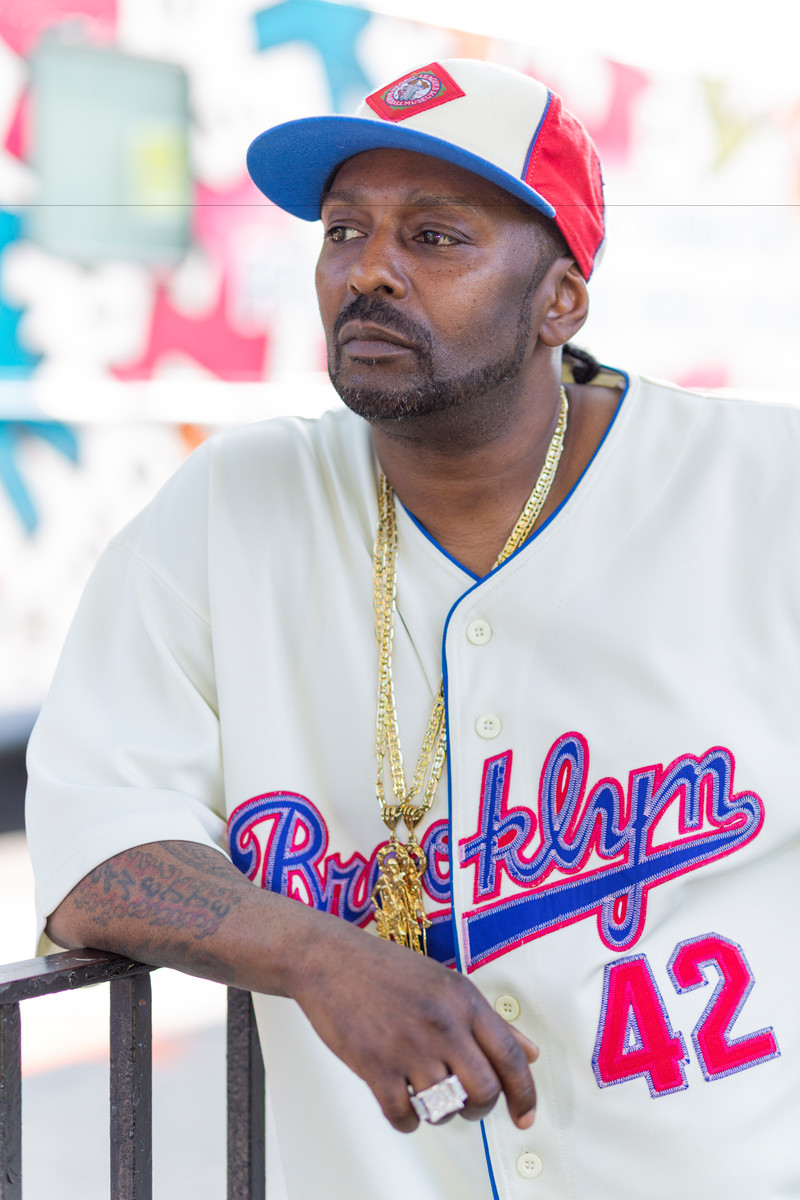
"They gave me hope to come back the next week"
It wasn’t the group meetings, the testing services or the health facilities that attracted Manny Norman, it was the offer of a free subway card and a bite to eat. A friend who was also a substance use told him about the workshops in a basement at a nearby community centre. Manny focused on the subway card which would be worth a few dollars if he sold it on. “I just wanted something to eat,” he says. “I hadn’t eaten in probably 20 hours. And the idea of getting more drugs without stealing sounded good to me.” Thirteen years later and he is still attending the Safety Counts meetings run by Planned Parenthood’s Project Street Beat, and credits them with helping him rebuild a life shattered by drug abuse. At the time, he explains he was neglecting his young family, stealing from them to buy crack cocaine and alcohol. His wife would call the police or lock him out of the home on an almost daily basis. “I was on crack and alcohol, the drugs that led me to dereliction, that led me to stealing, being unmanageable, not responsible, without a care in the world,” he says. “(I) didn’t want to work. I just wanted to feed my drug addiction.” Starting a new life But when he walked into the Safety Counts meetings, he says now, he realised he was among people who understood his life. “They met me where I was at,” he says. “They could tell I was under the influence. They could tell I was hurting, that I wasn’t doing the right thing and they made me feel no less than and no different. They gave me hope to come back the next week.” At first, he just went with the flow, focusing on the food and the subway card, not taking much notice of the services on offer. But eventually, he realised there were other people in the room he had come out the other side and rebuilt their lives. “We talked about harm reduction,” he says. “I could identify with the stories other people were telling. Lying, cheating, stealing, borrowing money knowing you wouldn’t pay it back.” Detox and rehab followed. He used the facilities of the projects mobile medical unit to get himself tested for Hepatitis C and HIV and has managed to stay clean, even training as an HIV outreach worker, and has rebuilt his family life. “It’s a happy home now,” he says. “My daughter got her father back, my wife got her husband back. Most of all I got myself back, thank God.” Without Project Street Beat he says his life would have continued its downward spiral. He would most likely be in prison today. Instead, he works as a supervisor for a cleaning company. And when he bumps into one of his friends from the old days he knows what to do. “When I walk down the street and see someone I know – someone I took drugs with or drank with – I let them know exactly where the mobile might be at,” he said. “I have cards in my pocket I give out to people and let them know this is the new way.” Watch Project Street Beat in action
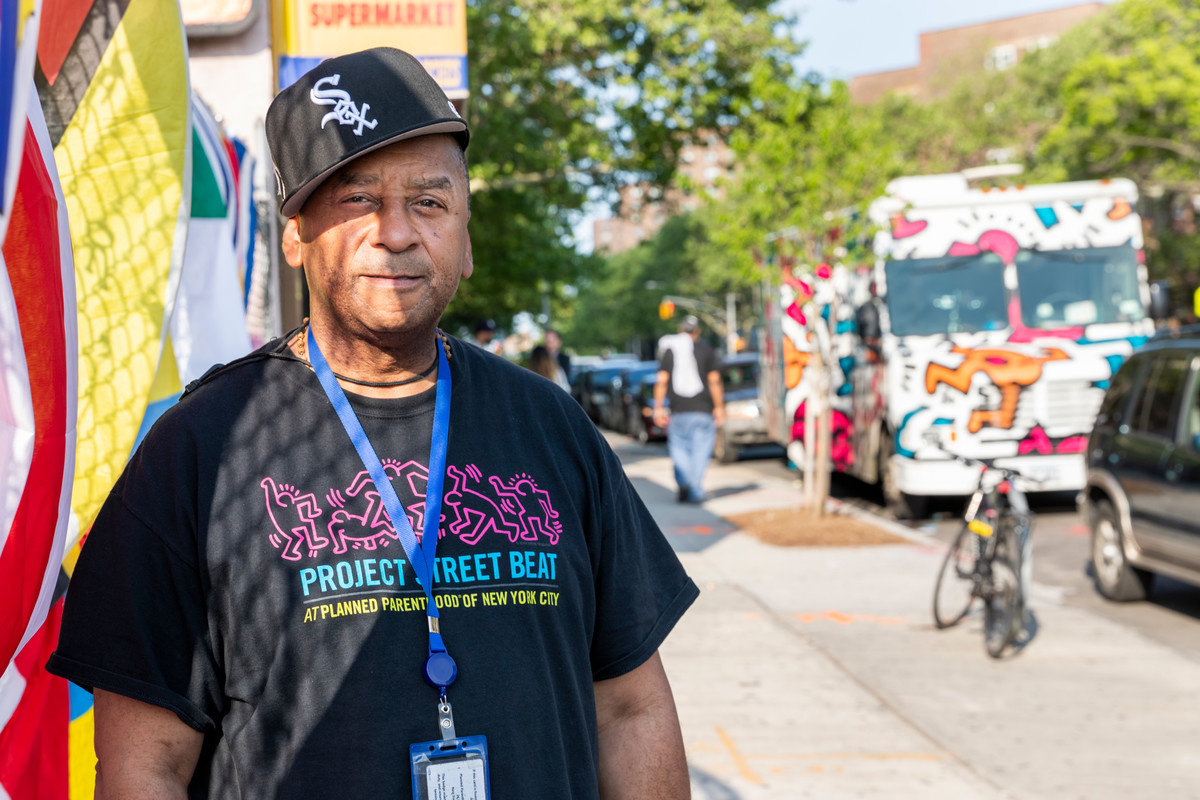
"I was part of the streets...I let them know I understand just how they feel"
A young man stops by a pile of rubbish at the side of the road. He fiddles with an abandoned umbrella, snapping off one of its broken ribs and slipping it into his backpack. Eric Fairchild spots the signs. The HIV prevention specialist greets the man like an old friend. “We got condoms, leaflets, testing right here,” he says standing in front of Planned Parenthood’s mobile medical unit. The man refuses initially, stepping into a nearby grocery store, before returning a few minutes later with his girlfriend to hear about the services on offer. The umbrella rib, says Mr Fairchild later, was a giveaway. It makes a perfect tool for scraping the residue from a substance pipe. Understanding and overcoming Eric has worked for Planned Parenthood for 12 years, using his experience growing up in the Brooklyn neighbourhood of Brownsville to help spot others who are in need of help. “I was part of the streets,” he says. “I was a substance abuser. Never injected, but I smoked, sniffed... stuff of that nature.” He has been clean for 26 years but explains that his experiences help him connect with other users. “The first thing I do when I have hardcore substance abusers sitting in front of me, I first show them identification,” he says. “I let them know I understand just how they feel. I’ve been there feeling hopeless, helpless, confused about where to turn.” Some occasions might mean he has to use the training and education he has received as an outreach worker. Other times it is a case of using his 60 years’ experience of life in Brooklyn. “That’s my benefit to the programme,” he says. “I’m street savvy as well as educated in the classroom. I have the best of both worlds.” Eric already had an extensive background in community work before joining the project, prompted by a desire to learn more about HIV prevention following the death of a relative and a friend died from the illness. He is often the first point of contact for clients, handing out pamphlets on the street corner, conducting HIV tests and explaining Project Beat Street– and the facilities available on the mobile unit to wary newcomers. From there he can offer advice and guidance on other services, from home care managers to sources of funding for people with HIV and setting up appointments at clinics. He follows up with phone calls and meetings, often at every step of a client’s progress. “I saw when they came in,” he says. “I saw them come in from a struggling situation, uncomfortable with their lifestyle at the time. Going from being an unproductive member of society to taking better care of themselves and being in a healthier situation that they were before. I am always happy to know I was part of that process.” Watch Project Street Beat in action

Project Street Beat: A mobile medical clinic in New York City
It might not be quite what you expect from a medical clinic in New York. But the compact room at the back of a truck parked on a street corner in Brooklyn’s Brownsville neighbourhood, a neighbourhood with the highest concentration of public housing anywhere in the country, is fitted with everything needed for a mobile health unit. For 30 years, Project Street Beat’s mobile medical unit has been working on the streets of New York, travelling to some of its most deprived zip codes offering HIV testing, sexual health screening, emergency contraception and a slew of services that have evolved to keep up with changing needs. Five days a week the colourful mobile unit travels between the Bronx, Brooklyn and northern Manhattan as part of a mission to provide care to people living beyond the traditional medical system. Brownsville is a regular stop off on the mobile clinic's route. Left behind by the gentrification sweeping across the rest of Brooklyn, mainly due to investors fear of crime and lack of transportation links to the wealthier Manhattan, Brownsville has the highest murder rate in the city and the lowest life expectancy in the district. “This is my exam room,” says Sarah Zuercher, a women’s health nurse practitioner. Barriers to treatment can include drug addiction or a lifestyle that brings suspicion of authority, explains Zuercher – the mobile unit’s lead clinician – or simply living without health insurance. Without insurance, any doctor’s appointment, prescription or hospital visit can run to hundreds, if not thousands of dollars. Life without medical insurance In Brooklyn, about 10 percent of people are trying to get by without insurance. Some are gambling that they can save a couple of hundred dollars a month if they stay healthy enough to avoid visiting a doctor’s surgery or hospital. Others, such as undocumented immigrants, fear that any interaction with officials carries the risk of deportation. “Then there are people who are just busy. Small business owners, people who don’t have flexible work schedules,” says Zuercher. “There aren’t a ton of medical services in this area. To travel into the city to go to one of our health centers is just not an option for women in jobs that don’t have a lot of flexibility.” And there are people like Bernard Andrews, whose heavy use of crack cocaine, marijuana and alcohol meant that although he found his way to free clinics after being diagnosed with HIV, he never managed to stick to a drug regime and treated doctors’ appointments as an inconvenience. “To tell you the truth I wasn’t managing at all. I was a wreck. I was at that point, where I didn’t care,” he says. “All I wanted to do was use drugs and sell medication because I was going to die anyway.” Mobile outreach projects might be more often associated with the developing world than one of the richest cities on the planet, but even in New York, it is the only way some people access medical services. These are the people who fall between the cracks of a city without a universal health care system, where the onus is on individuals to buy insurance and navigate their way through a complex web of competing providers as an informed consumer. Even the safety nets of Medicare and Medicaid, which pick up a chunk of the costs for the elderly and the poorest, require battling through an intimidating amount of bureaucracy. The result is hundreds of thousands of people across the city who don’t have regular check-ups and who cannot get treatment for niggling worries before they turn into full-fledged problems unless they can pay thousands of dollars out of their own pockets. Meeting people where they need services In recent years, America’s opioid epidemic has also had an impact. Now the unit offers training in how to use Narcan – a fast-acting antidote to overdoses. But the key to it all is meeting patients where they need services. “It only works because we come to where people are,” says Zuercher, who has worked on the unit for the past three and half years. “That’s the real difference. We are in neighbourhoods where people live and where people are.” On the fourth Wednesday of the month, the schedule brings them to Brownsville. By 9 am, a table is set up on the pavement displaying condoms, leaflets outlining available services and a sharps box for disposing of used needles. Eric Fairchild, an HIV prevention specialist, is on hand to explain what’s available and to use his experience of growing up in Brooklyn to put potential clients at ease. Fairchild’s job is to be on the frontline. Or at least the pavement. He grew up on these streets, he knows the people and the language. It is his job to engage passers-by, distributing leaflets and explaining the services on offer. He uses his own history of substance abuse to spot people in need and to put them at ease, offering them a non-judgemental reception. He also knows the pitfalls they face, perhaps better than they do yet. “I know the consequences – the things they don’t know,” he said. “It’s not a textbook conversation,” he says of his technique. “I’m not talking in ABCs, I’m talking to them in a language they understand. That’s my benefit to the programme. I’m street savvy as well as educated in the classroom.” For those that make it inside the mobile clinic come away with a dignity pack – a plastic bag containing some of the essentials of daily life including a toothbrush, paste, soap, deodorant, juice, potato crisps and oatmeal. “It’s an incentive to get them to stop and look. People are hungry. Maybe they don’t have money to get to appointments, so we have two-ride metro card tickets,” says Fairchild. At every step, the staff try to put clients at ease, offering a relaxed environment where they can feel comfortable talking about intimate issues such as sex. Last year, the clinic saw more than 2000 clients enrol for services. In addition, staff reached more than 6800 people informally on the street and conducted more than 1400 HIV tests. “Once people meet us and come on, it breaks down the distrust that many people feel about the medical system,” says Zuercher. “It might not erase it, but at least between us and our clients they feel we are offering something that is useful to them and can make their lives a little bit better.” The mobile unit manages to include a small counselling room and a bigger space to hold meetings. But its days are numbered. A new truck is scheduled to come into service in the summer. It is all part of a strategy to ensure the very highest standards, says Zuercher. “Even though we gear our services to specific populations but what we strive to do is provide the highest possible quality services so that anybody who walks in here would feel like they were getting appropriate care and they were getting high-quality care.” Some patients use the mobile unit is an introduction to other services offered by Planned Parenthood, setting up appointments at clinics or getting help with sources of funding to manage the costs of HIV care. For Zuercher the most rewarding clients are the ones who return to the mobile unit year after year. “It means a lot to be able to keep engaging with people, seeing how their life is developing in a positive way.” Watch Project Street Beat in action
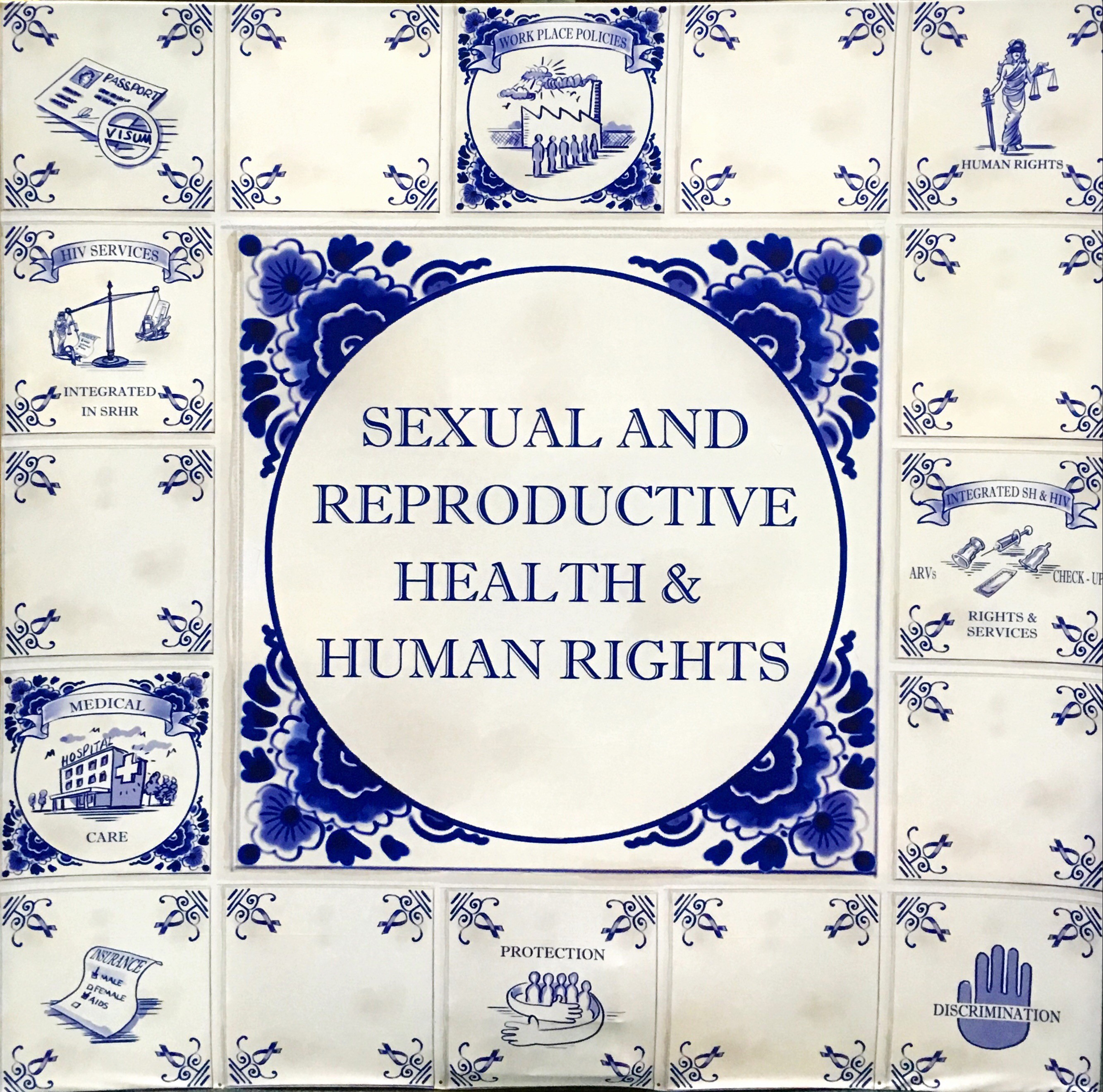
IPPF and Rutgers coordinate the first-ever SRHR pre-conference at AIDS2018
The International Planned Parenthood Federation (IPPF) and Rutgers are leading the coordination of the first-ever pre-conference focussed on sexual and reproductive health and rights (SRHR) ahead of the 22nd International AIDS Conference (AIDS 2018) in Amsterdam this year. With the Netherlands, a long-standing champion and supporter of SRHR, AIDS 2018 provides the perfect opportunity to help guarantee the health, rights, and general well-being of all people, including women and girls, people living with HIV, and key populations. While poor sexual and reproductive health and HIV share common root causes, the respective responses to HIV and to SRHR remain largely unaligned and uncoordinated. Now more than ever there is a need for joint action, but this need remains under-appreciated, inadequately resourced, and insufficiently leveraged for the greater good. The one-day pre-conference on 21 July 2018 will be organized for up to 100 participants and aims to create a vibrant and inclusive platform on which to: Foster thematic learning and networking focused on this integration Facilitate global connections Further unite HIV and SRHR responses to achieve the ambitious targets set within the Sustainable Development Goals – including lessons learned on the impact of the Global Gag Rule You can download the Pre-Conference Roadmap.







